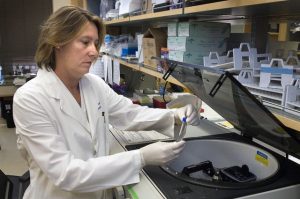Studies of Sex Differences in MS Led Researcher to Pregnancy Hormone as Potential Treatment

A pregnancy hormone called estriol may be effective in controlling relapses in women with multiple sclerosis (MS), says a researcher at the University of California, Los Angeles (UCLA).
In clinical trials, estriol has also lowered fatigue and improved thinking — work that originated in Rhonda Voskuhl’s quest to understand sex differences in MS.
Voskuhl, director of UCLA’s multiple sclerosis program, has helped change how sex differences are viewed in preclinical research.
Since 2016, all preclinical studies funded by the National Institutes of Health (NIH) must include both male and female experimental animals. To support this requirement, NIH cited a study by Voskuhl demonstrating sex differences in MS.

When the National Institutes of Health announced that all NIH-funded, preclinical studies include females and males, the federal agency cited Rhonda Voskuhl’s work. (Photo courtesy UCLA)
Voskuhl’s interest in MS and how men and women with the disease respond differently stems from her childhood experience with severe asthma and allergies. Inspired by her own doctor, she decided to become a physician and study autoimmune diseases.
Many autoimmune conditions, like MS, tend to affect mostly women. In fact, for every man who develops MS are three to four women with the disease. But men typically have a more aggressive disease course, with more rapid deterioriation.
When she first entered the medical research field 25 years ago, scientists showed little interest in why a disease might affect men and women differently. Voskuhl recalls how her postdoctoral project supervisor dismissed her when she expressed interest in the topic.
She was planning an MS study in mice, and her supervisor told her to order female mice only. Since male mice were less likely to get sick, they “were a waste of money,” he argued.
“I said, ‘But that’s kind of interesting, isn’t it? Like, why are females more susceptible?’ He said, ‘Nah! Just order the females and do the experiment.’ And that’s when I decided I wanted to study the sex difference in multiple sclerosis,” Voskuhl said in a press release.
This fascination led her to investigate why pregnant women with MS have fewer relapses. While not representing a full explanation, Voskuhl believes that estriol — produced by the fetus and placenta — may be key in this regard. The hormone is approved in Europe to treat menopausal symptoms.
Treating MS-like mice with estriol protects them from disease activity, and in 2016, Voskuhl’s research team showed that estriol, when added to Copaxone (glatiramer acetate) reduced relapses in women with relapsing-remitting MS.
Her study, published in the journal Lancet Neurology, also showed that the pregnancy hormone tended to reduce fatigue, improve cognition and slow the loss of brain volume, though these changes were not statistically significant. To better assess the role of estriol, her team now plans a larger clinical trial.
Another trial, focused on the ability of estriol to improve cognition in MS, is currently completing enrollment.
“The beauty of estriol is it both reduces inflammation and repairs damage in the brain and spinal cord, acting in a way that is new and different from other MS drugs,” she said. “This is important for patients since it means it could improve disabilities, not merely slow worsening.”
Besides the clinical trials, Voskuhl is also helping create a superior version of estriol to further improve treatment, along with the UCLA Technology Development Group. UCLA now hopes to partner with other entities to develop the compound into a useful therapy that may benefit patients — and potentially explain why MS affects men and women so differently.
“Study the differences, don’t just ignore them,” said Voskuhl. “It can lead to some really interesting treatments.”






